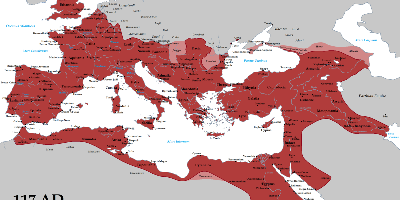First Triumvirate (1 janv. 60 av. J.-C. – 31 déc. 53 av. J.-C.)
Description:
First Triumvirate (60–53 BC) was an informal alliance among three prominent politicians in the late Roman Republic: Julius Caesar, Pompey, and Marcus Licinius Crassus.The constitution of the Roman Republic was a complex set of checks and balances designed to prevent a man from rising above the rest and creating a monarchy. In order to bypass these constitutional obstacles, Caesar, Pompey and Crassus forged a secret alliance in which they promised to use their respective influence to help each other. According to Goldsworthy, the alliance was "not at heart a union of those with the same political ideals and ambitions", but one where "all were seeking personal advantage." As the nephew of Gaius Marius, Caesar was at the time very well connected with the Populares faction, which pushed for social reforms. He was moreover Pontifex Maximus—the chief priest in the Roman religion—and could significantly influence politics, notably through the interpretation of the auspices. Pompey was the greatest military leader of the time, having notably won the wars against Sertorius (80–72 BC), Mithridates (73–63 BC), and the Cilician Pirates (66 BC). Although he won the war against Spartacus (73–71 BC), Crassus was mostly known for his fabulous wealth, which he acquired through intense land speculation. Both Pompey and Crassus also had extensive patronage networks. The alliance was cemented with the marriage of Pompey with Caesar's daughter Julia in 59 BC.
Thanks to this alliance, Caesar thus received an extraordinary command over Gaul and Illyria for five years, so he could start his conquest of Gaul. In 56 BC the Triumvirate was renewed at the Lucca Conference, in which the triumvirs agreed to share the Roman provinces between them; Caesar could keep Gaul for another five years, while Pompey received Hispania, and Crassus Syria. The latter embarked into an expedition against the Parthians to match Caesar's victories in Gaul, but died in the disastrous defeat of Carrhae in 53 BC.
The death of Crassus ended the Triumvirate, and left Caesar and Pompey facing each other; their relationship had already degraded after the death of Julia in 54 BC. Pompey then sided with the Optimates, the conservative faction opposed to the Populares—supported by Caesar—and actively fought Caesar in the senate. In 49 BC, with the conquest of Gaul complete, Caesar refused to release his legions and instead invaded Italy from the north by crossing the Rubicon with his army. The following civil war eventually led to Caesar's victory over Pompey at the Battle of Pharsalus in 48 BC and the latter's assassination in Ptolemaic Egypt where he fled after the battle. In 44 BC Caesar was assassinated in Rome and the following year his adopted son Octavian (later known as Augustus) formed the Second Triumvirate with Marcus Antonius and Marcus Aemilius Lepidus.
Ajouté au bande de temps:
Date:
1 janv. 60 av. J.-C.
31 déc. 53 av. J.-C.
~ 6 years
